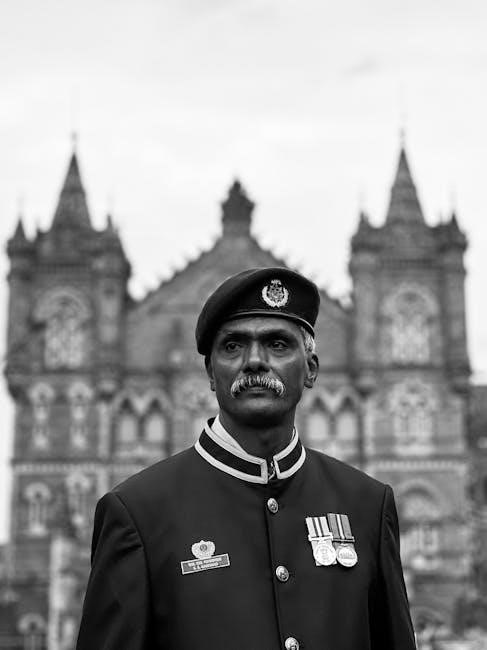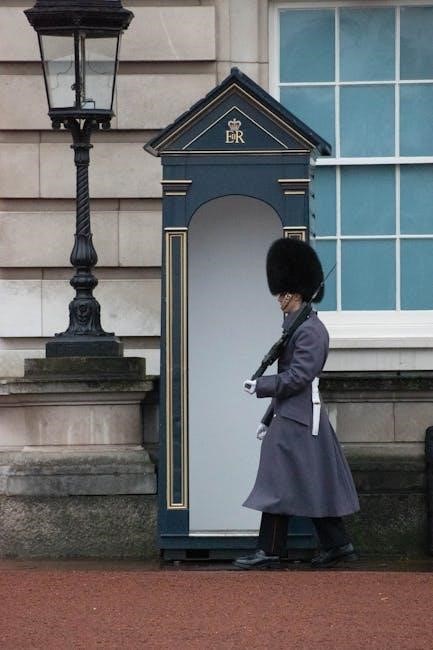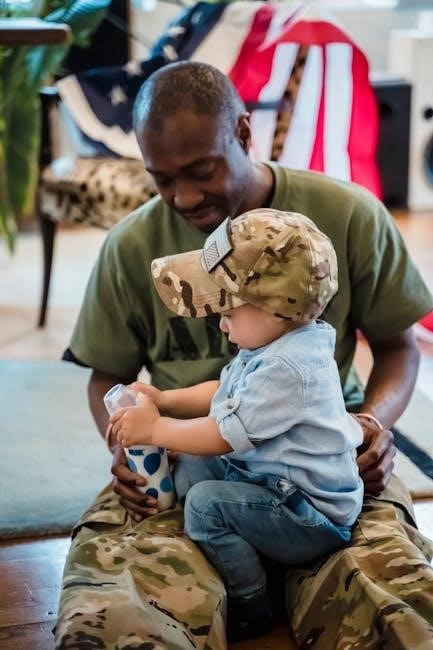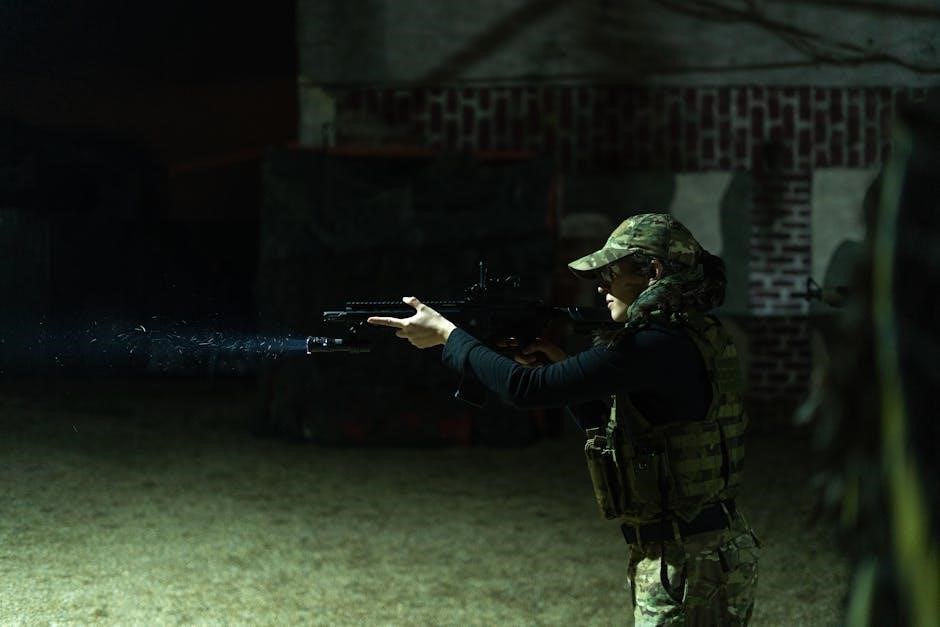Education and Training for Army Officers
Army officers undergo rigorous education and training, focusing on military knowledge, combat skills, and leadership development through academies, officer training programs, and continuous learning initiatives.
Officer Training Programs
Officer training programs are designed to equip candidates with the necessary skills and knowledge to lead effectively. These programs include Officer Candidate School (OCS), Reserve Officers’ Training Corps (ROTC), and direct commission paths. OCS focuses on military tactics, leadership, and physical fitness, preparing candidates for officer responsibilities. ROTC offers scholarships and training for students pursuing degrees, blending academic and military education. Additionally, specialized programs like West Point provide a four-year undergraduate education combined with military training. These programs emphasize character development, strategic thinking, and practical application of skills. Graduates emerge as commissioned officers, ready to lead troops and execute missions with confidence and professionalism.
Military Academies and Colleges
Military academies and colleges provide comprehensive education and training for aspiring officers, blending academic excellence with military discipline. Institutions like the United States Military Academy (West Point) offer four-year undergraduate programs, combining liberal arts education with rigorous military training. These academies emphasize leadership development, physical fitness, and ethical decision-making. Graduates earn a bachelor’s degree and a commission as officers. Additionally, specialized colleges like the Command and General Staff College (CGSC) offer advanced training for seasoned officers, focusing on strategic planning and operational leadership. These programs ensure officers are well-prepared to handle the complexities of modern military operations and lead with integrity.
Continuous Learning and Professional Development
Continuous learning and professional development are essential for army officers to stay effective in evolving military environments. Officers engage in ongoing education through formal courses, workshops, and self-study programs. These opportunities enhance leadership skills, tactical knowledge, and technical expertise. Mentorship programs also play a crucial role, pairing experienced officers with less experienced ones to foster growth. Additionally, officers are encouraged to pursue advanced degrees and certifications, which prepare them for higher-level responsibilities. Professional development ensures officers remain adaptable, innovative, and capable of addressing complex challenges. Regular training and education are integral to maintaining peak performance and aligning with the army’s mission and values. This lifelong commitment to learning ensures officers are always prepared to lead and succeed.

Leadership Skills for Army Officers
Army officers must possess strong leadership skills, including effective communication, decision-making under pressure, and mentorship. They lead by example, fostering resilience and teamwork to achieve mission success.
Effective Communication Strategies
Effective communication is critical for army officers to lead and inspire. Clear, concise messaging ensures understanding and execution of orders. Officers must master active listening, adapt communication styles to diverse audiences, and maintain composure under stress. Public speaking skills are essential, as officers frequently address large groups. They must also foster open dialogue within teams to build trust and collaboration. Using respectful and dignified language, officers uphold military values while conveying authority. These strategies enable seamless coordination, enhance decision-making, and strengthen unit cohesion, ultimately contributing to mission success.
Decision-Making Under Pressure
Army officers must excel in decision-making under pressure, a critical skill for mission success. They are trained to analyze situations quickly, weigh risks, and make sound judgments with limited information. Effective decision-making involves staying calm, prioritizing tasks, and considering long-term consequences. Officers learn to balance intuition with structured problem-solving techniques, ensuring clarity in high-stress environments. Training programs emphasize scenario-based simulations to refine these skills. Strong decision-making fosters trust within teams and maintains operational momentum. By mastering this skill, officers can lead confidently, even in uncertain or dangerous situations, ultimately contributing to the achievement of strategic objectives.
Mentorship and Team Building
Mentorship and team building are vital for fostering unity and leadership within military units. Army officers are encouraged to mentor subordinates, sharing knowledge and experience to enhance personal and professional growth. This fosters trust and strengthens team cohesion. Effective mentorship involves guiding soldiers through challenges, providing constructive feedback, and helping them achieve their potential. Team-building exercises, such as collaborative training and joint missions, cultivate camaraderie and improve communication. Officers must lead by example, demonstrating empathy and inclusivity to create a supportive environment. Strong mentorship and team dynamics ensure that units operate cohesively, enabling them to overcome adversity and achieve shared goals. These practices are essential for building resilient, capable, and motivated teams.

Career Development for Army Officers
Army officers benefit from structured career development programs, including advanced training, mentorship, and leadership opportunities, fostering continuous growth and professional excellence throughout their service.
Rank Progression and Promotions
Army officers progress through ranks based on merit, performance, and time-in-grade. Promotions are determined by evaluation boards, considering leadership skills, duty performance, and educational achievements. Officers must meet specific requirements for each rank, including completing advanced training and demonstrating readiness for increased responsibility. Mentorship and career tracking play a crucial role in guiding officers toward promotion. The system ensures that only the most qualified individuals advance, maintaining the highest standards of leadership and expertise within the military. Continuous assessment and feedback mechanisms support officers in achieving their career goals effectively.
Specializations and Expertise
Army officers can pursue various specializations to enhance their expertise, such as aviation, engineering, or cybersecurity. These specializations require advanced training and certifications, enabling officers to excel in specific roles. Mentorship programs guide officers in selecting specialties aligned with their strengths and career goals. Continuous learning opportunities, including workshops and certifications, ensure officers stay updated with evolving technologies and strategies. Specializations not only deepen technical knowledge but also prepare officers for complex leadership challenges. By acquiring specialized skills, officers contribute more effectively to mission success and advance their careers. This focus on expertise ensures the military maintains a highly skilled and adaptable force.
Networking and Career Opportunities
Networking is crucial for army officers to advance their careers and gain access to new opportunities. Building relationships with peers, mentors, and senior leaders fosters collaboration and opens doors to specialized roles. Professional events, conferences, and online platforms provide avenues for officers to connect with influential figures in the military and related fields. These connections often lead to mentorship opportunities, career guidance, and exposure to advanced training programs. Strong networks enhance an officer’s visibility and can lead to leadership positions or specialized assignments. Additionally, networking within military and civilian circles helps officers stay informed about career development resources, such as the Evaluation Entry System (EES), ensuring they are well-prepared for promotions and new challenges.

Personal Development for Army Officers
Personal development for army officers includes physical fitness, mental resilience, and adapting to military culture through structured mentorship and training programs.
Physical Fitness and Mental Resilience
Army officers must maintain peak physical fitness and mental resilience to handle demanding roles. Structured training programs emphasize strength, endurance, and agility, ensuring officers can lead by example. Mental resilience is cultivated through stress management techniques, mentorship, and continuous learning, enabling officers to remain composed under pressure. These elements are critical for overcoming challenges, making sound decisions, and inspiring troops. The Army prioritizes holistic development, ensuring officers are prepared to thrive in both physical and mental domains, fostering a culture of resilience and readiness.
Time Management and Organization
Effective time management and organization are critical for army officers, enabling them to balance multiple responsibilities and prioritize tasks efficiently. Officers use structured schedules and digital tools to stay organized, ensuring seamless execution of missions and personal development. Strong organizational skills enhance decision-making and leadership, allowing officers to delegate effectively and maintain order under pressure. These competencies are cultivated through rigorous training and continuous practice, ensuring officers can manage their time wisely while maintaining focus on strategic goals. Proper organization also fosters accountability and preparedness, essential for overcoming challenges in both professional and personal spheres.
Adapting to Military Culture
Adapting to military culture is a cornerstone of success for army officers, requiring a deep understanding of its unique values, traditions, and expectations. Officers must embrace discipline, respect for hierarchy, and teamwork, fostering a strong sense of camaraderie and shared purpose. The transition involves aligning personal behavior with military protocols, such as proper etiquette, uniform standards, and adherence to chain of command. Mentorship programs and training initiatives help officers navigate this cultural shift, ensuring they embody the military’s core values. Effective adaptation enhances leadership credibility and fosters trust within units, enabling officers to thrive in the demanding environment and contribute to mission success.

Ethical Conduct and Professionalism
Ethical conduct and professionalism are fundamental for army officers, requiring adherence to military ethics, respect for authority, and maintaining dignity in all interactions to uphold core values.
Understanding Military Ethics and Values
Understanding military ethics and values is crucial for army officers, as it forms the foundation of professional conduct and decision-making. These principles, rooted in respect, integrity, and service, guide officers to uphold dignity and fairness in all interactions. Adherence to these values ensures trust within the ranks and fosters a culture of accountability. Officers are expected to lead by example, demonstrating unwavering commitment to ethical standards. This understanding is reinforced through training and real-world applications, ensuring alignment with the military’s core mission and principles. Ethical awareness not only shapes individual behavior but also contributes to the overall effectiveness and reputation of the armed forces.
Respect for Authority and Dignity
Respect for authority and dignity is a cornerstone of military professionalism. Army officers must demonstrate unwavering respect for the chain of command, while also treating all personnel with dignity, regardless of rank or position. This fosters unity, discipline, and cohesion within the organization. Officers are expected to lead by example, showing respect to superiors, peers, and subordinates alike. This principle extends beyond formal interactions, encompassing how individuals are treated in both professional and personal contexts. Maintaining respect for authority and dignity is essential for building trust, fostering teamwork, and upholding the moral fabric of the military. It is a fundamental aspect of ethical leadership and service in the armed forces;
Public Speaking and Presentation Skills
Public speaking and presentation skills are essential for Army officers to communicate effectively with troops, leaders, and audiences. Officers must develop confidence and clarity in articulating ideas, ensuring messages are conveyed convincingly. Whether addressing large groups or conducting briefings, strong presentation skills are vital for conveying authority and inspiration. Practical training and continuous practice help officers refine their delivery, engage audiences, and adapt to diverse settings. Effective public speaking fosters trust, collaboration, and mission success, making it a critical competency for military leaders.




About the author